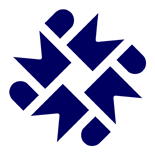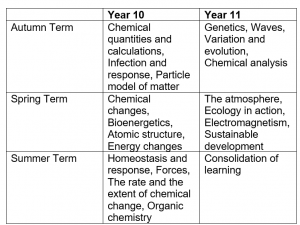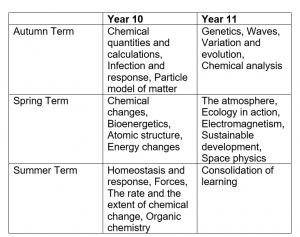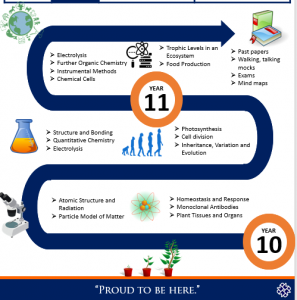Key Stage 4: Science
Curriculum Intent
The Science Department at Murray Park School aims to ensure that every student is able to understand and critically evaluate any scientific problem they may be faced with in an ever-changing, modern world. Through the courses that we offer, we provide an inspiring range of experiences both in and outside the classroom.
Biology, chemistry and physics are fascinating, ever-growing and ever-developing fields of study. The range of careers available to students who study the sciences are always at the forefront of the media, government and world affairs. Science is changing our lives and is vital to the world’s future prosperity. All of the students at Murray Park School are taught essential aspects of the knowledge, methods, processes and uses of science. We provide our students with the experience and the opportunities to develop their scientific knowledge in addition to developing their enquiry, descriptive, explanatory, analytical, mathematical and evaluation skills. These skills enable our students to discuss confidently current affairs regarding nature, the environment and health.
The curriculum is challenging and through the teaching of this subject we evoke curiosity and questioning from the students so that they develop a wide range of scientific knowledge. The Science Department is committed to ensuring that all students learn different skills and knowledge across both key stages in this exciting subject. We uphold and display the values of the school and encourage the students to be bold at every possible opportunity within our subject area.
The sciences are taught in ways that ensure the students have the knowledge to enable them to develop curiosity about the natural world, insight into working scientifically, and appreciation of the relevance of science to their everyday lives. The national curriculum for key stage 4 science ensures that the students:
- develop scientific knowledge and conceptual understanding through the specific disciplines of biology, chemistry and physics;
- develop understanding of the nature, processes and methods of science, through different types of scientific enquiry that help them to answer scientific questions about the world around them;
- develop and learn to apply observational, practical, modelling, enquiry, problem-solving skills and mathematical skills, both in the laboratory, in the field and in other environments;
- develop their ability to evaluate claims based on science through critical analysis of the methodology, evidence and conclusions, both qualitatively and quantitatively.
The Science Department follows the AQA examination courses.
- The Combined Science course consists of six exam papers (one hour and fifteen minutes each).
- The Triple Science course (Separate Sciences) consists of six exams papers (one hour and forty-five minutes each).
- The students are taught Biology, Chemistry and Physics separately within each topic.
Subject content – Biology
Biology is the science of living organisms (including animals, plants, fungi and microorganisms) and their interactions with each other and the environment. The study of biology involves collecting and interpreting information about the natural world to identify patterns and relate possible cause and effect. Biology is used to help humans improve their own lives and to understand the world around them.
Subject content – Chemistry
Chemistry is the science of the composition, structure, properties and reactions of matter, understood in terms of atoms, atomic particles and the way they are arranged and link together. It is concerned with the synthesis, formulation, analysis and characteristic properties of substances and materials of all kinds.
Subject content – Physics
Physics is the science of the fundamental concepts of field, force, radiation and particle structures, which are inter-linked to form unified models of the behaviour of the material universe. From such models, a wide range of ideas, from the broadest issue of the development of the universe over time to the numerous and detailed ways in which new technologies may be invented, have emerged. These have enriched both our basic understanding of, and our many adaptations to, our material environment.
Curriculum Overview
The students demonstrate their knowledge and understanding of concepts, terms and issues in biology, chemistry and physics. This will be achieved through the development of experimental skills and by embedding knowledge that can be described and explained using key words and concepts.
The students will also apply knowledge and understanding of concepts, terms and issues to specific contexts. This will be undertaken through studying scenarios in various theoretical settings. In all areas of the science curriculum, the students will use their numeracy and literacy skills to expand ideas and to draw conclusions.
During Key Stage 4, the students will analyse and evaluate a range of evidence relating to scientific theory. They will have the opportunity to analyse a variety of data and evidence.
Year 10
The students will be taught a variety of topics within biology, chemistry and physics. In biology, they will learn to apply knowledge and skills to concepts such as infection and disease, photosynthesis in bioenergetics and homeostasis and the control of the internal conditions of the body. In chemistry, the students will learn to apply their knowledge and skills to concepts, such as, chemical and energy changes and organic chemistry. They will be challenged mathematically in quantitative chemistry. In the physics, the students will study concepts such particles, using models to explain their behaviour, forces and the atomic structure.
Year 11
In this year, the students will apply their knowledge and skills to concepts such as genetics, variation and ecology in biology. They will explore areas such as chemical analysis that is used in forensics, the early and current atmosphere and sustainable development. Their study of physics will include topics, such as, waves. The students will learn about electromagnetic waves, for example, microwaves and how we use them in everyday life and they will also learn about electromagnetism. Students who study the separate science course will also study space.
KS4 Curriculum
The students will study the separate sciences pathway or the combined sciences pathway.
The Combined Science Course
There will be six exam papers with a Paper 1 and Paper 2 element for each subject within Science (two for biology, two for chemistry and two for physics). Each paper will be 1 hour and 15 minutes in length.
Paper 1
This paper will cover the topics taught in the first year (Year 10) of the GCSE national curriculum programme. These topics will be revisited throughout the year and also during the second year of the course.
Paper 2
This paper will cover the topics taught in the second year (Year 11) of the GCSE national curriculum programme. It will also revisit topics from the first year.
There are a number of experiments which will be undertaken throughout the GCSE programme of study. Within these experiments, there are a set of experiments called ‘Required Practical (RPA) which may feature in the examination papers.
The Triple Science Course
There will be six exam papers with a Paper 1 and Paper 2 element for each subject within Science (two for biology, two for chemistry and two for physics). Each paper will be 1 hour and 45 minutes in length.
Paper 1
This paper will cover the topics taught in the first year (Year 10) of the GCSE national curriculum programme. These topics will be revisited throughout the year and also during the second year of the course.
Paper 2
This paper will cover the topics taught in the second year (Year 11) of the GCSE national curriculum programme. Topics from the first year will also be revisited.
There a number of experiments that will be undertaken throughout the GCSE programme of students. Within these experiments, there are a set of experiments called ‘Required Practical (RPA) which may feature in the examination papers.
Extra-curricular activities
We supplement our broad curriculum with a range of extra-curricular activities to enrich the students’ experiences and enjoyment of learning.
In addition to the STEM and ECO clubs, students in Years 10 and 11 are encouraged to attend the Commit to Six after school revision sessions on Mondays and the breakfast sessions. These sessions provide the students with the perfect opportunity to gain additional teacher support in relation to their courses.




